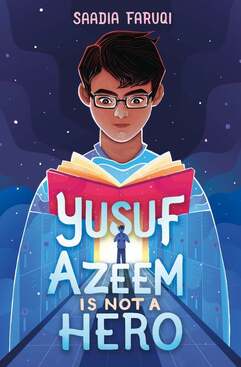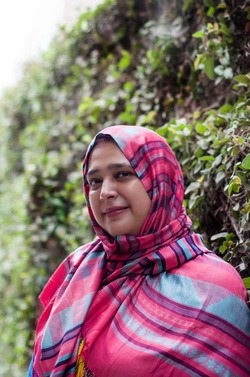|
Interview with Saadia Faruqi on Trauma, Islamophobia and 9/11 by Aya Khalil Aya: Hello, Saadia! I am so happy I get to interview you for Kidlit in Color about your new upcoming middle grade book, Yusuf Azeem is Not a Hero, which comes out on September 7 from Quill Tree Books/Harper Collins! Can you please tell our readers a brief summary of your book? Saadia: Thank you for interviewing me! This book is about 9/11 and the experiences of the Muslim American community in the last twenty years. The main character, eleven-year-old Yusuf Azeem is looking forward to starting middle school and participating in a regional robotics competition. When school begins and bullies start coming out of the woodwork, he realizes that this year is going to be more difficult than he thought, because it’s the twentieth anniversary of the 9/11 terrorist attacks. A group of white supremacists are riling the townspeople up, harassing Yusuf’s community, and protesting the new mosque. Yusuf begins to read his uncle’s journal from 2001 to understand the September 11 attacks and how they changed life for Muslims like him before he was even born. As tension escalates, and his friends and family get more scared, Yusuf has to chose whether he will ignore the hostility or stand up and be a hero. Aya: This is such an important topic to discuss in books. Especially from a Muslim perspective. I absolutely loved reading an arc of this book a couple of months ago and it took me back to 2001 when I was in high school during the 9/11 attacks. Can you tell us where you were on that awful day and what feelings crossed your mind? Saadia: Everyone probably remembers where they were on September 11, 2001, what they were doing and feeling. It’s such a visceral, traumatic memory for most people, even those who lived far away from New York City because we were watching things unfold in real time on television and radio. I was in college that year, and I remember my husband calling me from his office to ask if I’d watched the news because he couldn’t figure out if it was a joke or not. I went to campus and everyone was so quiet and serious, not just on that day but for days afterwards, as if all the laughter had been snatched up from the halls. I don’t remember much about how I felt, just that quiet stillness, a wondering of what would happen next. Aya: Many of us were silent out of shock, that’s for sure. I could really relate to Yusuf in this story because I grew up in two small towns: I went to elementary school in North Dakota and I went to middle school in Lima, Ohio. This was pre-9/11 but Islamophobia didn't start after 9/11, so I remember a lot of micro-aggressions and racism then. Why did you write this story and why is it important to tell? What about Muslims kids who are growing up small towns now and facing similar experiences; what do you want to say to them? Saadia: Islamophobia has been prevalent in the U.S. since the first Muslims arrived on these shores. It’s human nature to fear and hate what we don’t understand, and media always twists how people are represented in ways that are very negative and hurtful. I wrote this story because I was tired of these media depictions, especially around the anniversary of 9/11 each year. I wanted to highlight all the ways Muslims have been demonized and misrepresented, bullied and hated, in the last twenty years. It’s personal to me because as a Muslim mother, raising Muslim kids, the prejudice is too close to home and just cannot be ignored. I want to tell Muslim kids that I see the bullying you endure, and the ways you feel unwelcome in your schools and neighborhoods just because of your faith. I want to tell them that your experiences are valid, and that you’re not alone. Aya: Yes, so important to validate those feelings. I don't want to give too much away or for spoilers, but there's a central part in the story that made me emotional. It was when the Muslim families were working hard to build the mosque and they were faced with lots of hate and pushback from the community. It reminded me when my friends and I gave a presentation at a local place to "convince" people to build a mosque in our community. We were faced with so much hostility and the city turned our proposal down. I still think about it often. Why did you choose to write about this and is this based on any experiences you have faced? Saadia: One of the central plot points of this book is obstructing the construction of a mosque that Yusuf’s Muslim American community is building. After many attempts at stopping construction through intimidation, a white supremacist group complains to the city government and holds a zoning meeting to achieve its aims. Although I don’t have personal experience in this, I learned while I was exploring 9/11 and its repercussions that this happens throughout the U.S. on a regular basis. In fact, the ACLU monitors anti-mosque activity including violence, vandalism and the use of city zoning laws to block construction. More examples are available here (https://www.aclu.org/other/mosques-and-community-centers). Aya: Thanks for sharing that link. What do you hope readers will gain or understand after reading Yusuf Azeem is Not a Hero? Both Muslims and people of other faith? Saadia: My biggest hope is that readers will understand the long-term repercussions of 9/11 in our culture and society. When we discuss 9/11, we mostly talk about the attacks themselves, or the victims who lost their lives. We forget about the things that came after: the wars and the government policies, and the prejudice against all those who looked like “the enemy.” For my Muslim readers, I hope they see themselves in this book and take heart that someone is telling their story, acknowledging their pain. For non-Muslim readers, my hope is that they’ll walk a mile in my shoes and see what it’s like to be Muslim American in a post 9/11 world, not so that they can pity us but so that they can demand change from their communities and governments, and so that they can learn to be true allies the way the characters in the book do. Aya: I know it will make readers think and reflect. How long did it take you to write this and what are some challenges, if any, you faced while writing it? Saadia: I’m a pretty fast writer. I think it took me 4-5 months to write this book. My biggest challenge was that once I started writing, I realized I didn’t have all the information I needed to write the historical parts of this book accurately, so I had to pause and conduct interviews of several people to bridge those gaps. Another challenge was writing really emotional and difficult scenes in a way that wouldn’t traumatize young readers but feel authentic at the same time. With time and a lot of revisions, I think I was able to capture the essence of the story. Aya: Thanks for letting me interview you! Fun questions time! Your favorite food? Saadia: Biryani and pizza, but not together. Aya: Your favorite color? Saadia: All shades of blue. Aya: Your favorite city? Saadia: That’s a difficult question. It’s wherever I have loved ones. Aya: What are you currently reading? Saadia: I’m getting started on The Samosa Rebellion by Shanti Sekaran. Order Yusuf Azeem Is Not A Hero here. Saadia Faruqi is a Pakistani American author, essayist and interfaith activist. She writes the children’s early reader series Yasmin and other books for children, including middle grade novels A Place At The Table co-written with Laura Shovan (a Sydney Taylor Notable 2021), and A Thousand Questions (a South Asia Book Award Honor 2021). Her new book Yusuf Azeem Is Not A Hero details the experiences of the Muslim American community twenty years after 9/11. Saadia is editor-in-chief of Blue Minaret, a magazine for Muslim art, poetry and prose, and was featured in Oprah Magazine in 2017 as a woman making a difference in her community. She lives in Houston, TX with her husband and children.
https://saadiafaruqi.com/
Kirstie
9/14/2021 12:13:25 pm
Congrats Saadia. I am currently reading this book and enjoying it immensely. Comments are closed.
|
Archives
July 2024
Categories
All
|


 RSS Feed
RSS Feed



